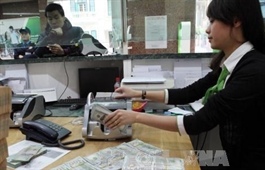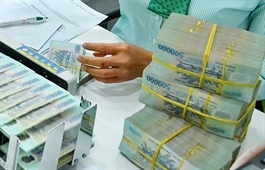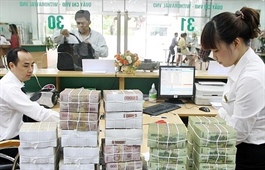ASEAN needs to collaborate for better tax policy: report
ASEAN needs to collaborate for better tax policy: report
ASEAN and all member states must collaborate to establish a better tax policy system to build sustainability and resilience across the region, found a report launched on Thursday in Ha Noi. 
The report 'Towards Sustainable Tax Policies in the ASEAN Region: the Case of Corporate Tax Incentives' by the Viet Nam Institute for Economic and Policy Research (VEPR), Oxfam, Tax and Fiscal Justice Asia (TAFJA), the PRAKARSA and Viet Nam Tax Justice Alliance (VATJ) proposed solutions for ASEAN to improve policies and actions for increasing domestic revenue to fund public goods.
With ASEAN suffering from unprecedented economic inequality, the region has struggled to invest sufficiently in public goods due to a lack of tax revenue. Raising revenue was critical to overcoming interrelated challenges like high levels of poverty, widening inequality and the climate crisis while recovering from the COVID-19 pandemic, the report found.
The report cited statistics that 11 per cent of ASEAN's 653.9 million people struggled in poverty well before COVID-19 and this number might go up rapidly with economic activities slowing and recovery a long way away.
The governments were handicapped in spending on public wellbeing, and all ASEAN countries would likely face budget deficits in 2020 at an average of 4.2 per cent of GDP, compared to the average budget deficit of 1.5 per cent of GDP in 2018.
Some countries were also heavily indebted. With escalating spending to battle the pandemic, its economic fallout, and falling tax revenues due to crippled productivity, deficits and debt were likely to keep mounting, according to the report.
The report pointed out that in ASEAN, revenue collection levels as a ratio to GDP remained very low in comparison to other regions. In 2018, the ASEAN average was 19.1 per cent of GDP, less than half of that of the Organization for Economic Co-operation and Development (OECD) countries and lower than the average of Latin America and the Caribbean.
“Now, more than ever, ASEAN and the member states must collaborate and agree upon a common minimum standard for corporate tax incentives in the region. They need to prevent harmful tax practices that drain essential public revenue and create self-destructive competition among members,” Nguyen Duc Thanh, VEPR’s Chief Advisor, said.
“The tax incentives have helped big corporations to prosper at the expense of Asian people. This must come to an end. ASEAN must blacklist - draw a line - and say no to harmful tax incentives which drastically deplete much needed national revenues. If any incentives are to be allowed, they must only be meaningful investments that benefit the people, with no exceptions,” Thanh stressed.
Countries in ASEAN were still highly dependent on revenue from corporate income tax (CIT). However, they were giving up huge amounts of revenue by offering large tax incentives to foreign investors and were losing a significant amount of potential tax revenue, about 6 per cent of GDP in Cambodia and 1 per cent of GDP in Viet Nam.
Of note, countries in the ASEAN region were competing with one another in a disastrous race to the bottom by reducing their CIT rates and offering aggressive tax incentives to foreign multinationals.
The report pointed out that across the region, the average CIT rate had fallen over the last 10 years, from 25.1 per cent in 2010 to 21.7 per cent in 2020. Taking into account tax holidays of up to 20 years and other enormous profit-based incentives offered to multinationals by some countries, the effective corporate tax rate is on average 9.4 percentage points lower.
“ASEAN countries with similar economies often compete with each other by offering greater incentives than their peers in order to attract investments from multinationals, rather than coordinating their actions to secure collective gains. The process of shifting production from China to the ASEAN region may worsen this competition between countries, as they seek to attract FDI inflows to further their own interests in boosting economic development, without seeing the wider regional picture,” the report wrote.
Tax incentives tend to create an unfair investment environment for small and medium-sized local companies. In Viet Nam, the effective CIT rate for foreign companies in the manufacturing sector in 2016 was 8 per cent but for domestic companies, it was 14.5 per cent, and it was even higher for large State-owned enterprises at 16 per cent.
“ASEAN member states need to collaborate and discard 'beggar-thy-neighbour' tax policies, including race-to-the-bottom tax incentives that translate into lost revenues which have left poorer countries and people struggling to make ends meet," Ah Maftuchan, Co-coordinator of TAFJA said.
According to the report, the region needs to set up a blacklist of tax incentives to phase them out across the region. They should agree on a whitelist of tax incentives that are acceptable and allowed. A transparent and accountable mechanism should be put in place at the ASEAN level to monitor developments in tax policy and to decide which incentives should be blacklisted or whitelisted.
Besides, ASEAN need to agree on a common minimum tax standard. The appropriate rate may range from 12.5 per cent to 20 per cent to protect countries’ domestic tax revenues and stop the beggar-thy-neighbour approach to policy making.
Finally, ASEAN need to agree on rules for the good governance of tax incentives.



























